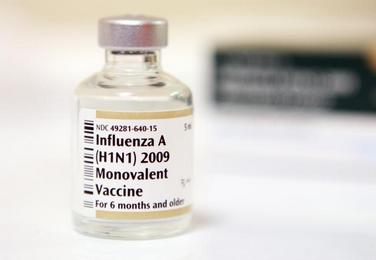A vaccine against H1N1 flu – The vaccine against swine flu
What is swine flu H1N1?
Fripp H1N1 (original name swine flu) – respiratory infection. H1N1 flu 2009 It has reached the level of pandemic. Pandemic – worldwide outbreak.
Primary transmission of H1N1 – Contact with an infected person. Patients with influenza can infect others through coughing and sneezing. It is also possible to get the flu, touching contaminated objects. Chronic diseases, such as heart disease or lung, diabetes or cancer may increase the risk of developing more severe flu.
Symptoms of H1N1 influenza may include:
- Fever and chills;
- Sore throat;
- Cough;
- Severe muscle aches;
- Severe fatigue;
- Headache;
- Cold, nasal congestion;
- Sneezing;
- Watery eyes;
- Symptoms in the stomach – nausea, vomiting and diarrhea.
Most people recover at home. Basic care includes rest, drinking fluids and taking pain, otpuskaemыh without prescription. They may be used anti-virals, such as zanamivir and oseltamivir (Tamiflu). They may be taken for the prevention and treatment of H1N1 infection.
What is the H1N1 flu vaccine?
The vaccine is a medicine, used to protect against infections, caused by bacteria and viruses. There are two methods of administration of the H1N1 vaccine:
- An injection into the muscle – used inactivated vaccine, containing dead virus;
- Nazalynыy spray – used live vaccines, containing attenuated virus.

Virus, contained in the vaccine does not cause disease. Keep in mind, even if you have been vaccinated, you can still get the flu H1N1. If you have symptoms of flu inform your doctor.
Who and when to be vaccinated against swine flu?
You should be vaccinated following groups:
- Pregnant women;
- They, who are living with or caring for a child under the age of six months;
- Medical staff and ambulance staff;
- Persons aged from six months to 24 years;
- Persons aged 25-64 years with chronic diseases (eg, asthma) or a weakened immune system;
There should also be grafted:
- People, living in remote areas;
- People, engaged in the handling of pigs and poultry.
Pregnant women should be vaccinated by injection (inactivated vaccine), but not nasal spray (contains live, attenuated viruses).
With a shortage of the vaccine should first be vaccinated following groups:
- Pregnant women;
- They, who are living with or caring for a child under the age of six months;
- Medical staff and ambulance staff;
- Persons aged from six months to four years;
- Children 5-18 years with chronic diseases.
After vaccination target groups should be vaccinated persons aged 25-64 years. Elderly people (senior 65 years) They may be vaccinated at least. (Older less likely to become infected with swine flu, than the young.)
Nasal Spray is administered in two doses with a difference of one month for children 2-9 years. Some doctors recommend to reduce the period between the receipt of the vaccine up to two weeks instead of one month. Persons aged 10-49 years will only need one dose of the vaccine as a nasal spray.
Vaccination is carried out by injection in two stages with a difference of one month – for children aged from six months to nine years. Some doctors recommend to reduce the period between vaccination and three weeks instead of a month. Persons between the ages of 10 s needs only one dose of vaccine.
Flu season can begin in October, and ending in late April or May. The best time for vaccination – time before the start of the flu season.
Who should not be vaccinated against swine flu?
Vaccination can not be held, if present egg allergy, as most vaccines are made using components of eggs.
Nazalynыy spray (live attenuated vaccines) can not be assigned to the following groups of the population:
- Persons under the age of two years old or older 50 years;
- Persons with severe chronic illnesses or weakened immune system;
- Pregnant women;
- Children under 18 years, aspirin.
Is the H1N1 vaccine safe?
As seasonal flu vaccine, H1N1 vaccine does not cause any complications, except for pain at the injection site. Individuals with certain allergies (eggs, latex, or certain drugs) You should consult your doctor, first vaccination against influenza.
IN 1976 year after vaccination against influenza cases were detected Guillain-Barre syndrome (SGB). Number of cases, associated with vaccination was about 1 cases per million vaccine doses. After 1976 Year influenza vaccination has not been clearly linked to GBS.
What other ways besides vaccination can prevent influenza H1N1?
- Often MY Ruki, especially, when you come in contact with the flu. Wash your hands for 15-20 seconds with soap and water. It is also helpful to handle hands with an alcohol solution;
- Avoid close contact with people, who are sick with respiratory infections. Influenza can be transmitted per day until seven days after the onset of symptoms;
- It is recommended to use disposable masks, If you have a high risk of severe illness from the flu and you can not avoid crowds;
- Cover your mouth and nose with a tissue when coughing or sneezing. Discard it after use;
- Do not spit;
- Do not share drinks or personal items to others;
- Do not bite your nails or rub his hands near the eyes, mouth or nose;
- Wipe surfaces with a household disinfectant;
- Ask your doctor about taking antiviral drugs.
What happens in the event of an outbreak of H1N1 flu?
Recommended measures could include isolation and special handling infected objects. In some cases, objects, perhaps, They must be closed for a period of time (usually up to closure of the epidemic).
